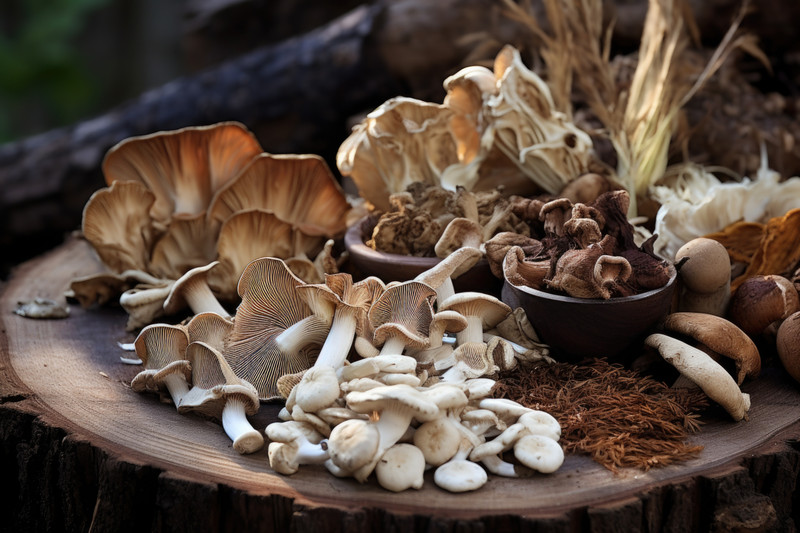Medicinal mushrooms are a blast from the past. Various species of mushrooms have been used for many centuries for an assortment of medicinal and treatment purposes. That might be news for connoisseurs of the culinary arts who savor mushrooms for what they can offer in taste at the dinner table.
As for the health-enhancing ability of mushrooms, take the word of fifth-century Chinese alchemist Tap Hongjing, who was known to praise the healing properties of mushrooms. Or the recommendation from renowned Greek physician and philosopher Hippocrates, a widely-known proponent of how certain fungi – yes, mushrooms are fungi – excelled as anti-inflammatories in the treatment of certain health conditions.
The Many Health Benefits of Mushrooms
While the treatment of diseases and other health-related infirmities and conditions offered by mushrooms has been in practice for thousands of years, it is a relatively new concept in America and the rest of the western world. But we have caught on relatively quickly to the tremendous value offered by mushrooms, with a wide spectrum of pharmacological activities that, for starters, include the following:
- Antimicrobial
- Anti-inflammatory
- Antidiabetic
- Antioxidative
- Antiviral
- Digestive
- Hypotensive
- Neuroprotective
- Antiallergic
- Prebiotic
Considering the vast array of healthy properties associated with various mushroom fungi, it stands to reason that there is an impressive lineup of mushroom supplements available over the counter ready for public consumption. Following are five types of mushroom supplements to consider stocking in your kitchen or bathroom cabinets in case the need arises for healing or enhanced health as described below.
5 Mushroom Supplements that Can Promote Health and Healing
Chaga. First, a disclaimer of sorts. Chaga is not actually a mushroom. We admit it. But its name derives from a Russian word for “mushroom”; plus it grows on trees, and it provides a number of medicinal benefits. So we’ll go ahead and include it here as an honorary member of the mushroom family. Chaga’s value includes a reputation for treating skin conditions that seem to otherwise defy contemporary treatments, and it has shown a propensity for treating – “healing” has even been mentioned – stomach ulcerations. Bonus points: Chagas are high in fiber and low in calories.
Cordyceps. If you want to go looking for some of these yourself, you might want to start by booking a trip to Tibet. Cordyceps is known as a “caterpillar fungus” because of its tendency to feed and grow on caterpillars. No matter, cordyceps serves many health-related purposes, at least in the eyes of competitive athletes. Research suggests that supplementation with it can not only help maximize a person’s metabolic activities but also reduce levels of exercise, oxidative stress, and exercise-related fatigue. Credit for those attributes appears to go to cordyceps’ relationship with adenosine triphosphate, a key fuel source for the body’s cells.
Maitake. The Japanese translation for “maitake” is “dancing mushroom,” and its nickname in North America is “hen of the woods.” Interesting. So even before we start talking about this mushroom, we have already grown fond of it. That said, the “dancing mushroom” reference refers to the legend that says people searching for maitake would dance for joy when they found it. And why not? Its abundance and variety of beta-glucans can help bolster insulin resistance. It can also work as a potent immune function regulator as well as play a supporting role in metabolic health. Still more potential benefits include lowering blood pressure and cholesterol levels, enhancing fertility, and regulating blood sugar levels.
Reishi. This type of mushrooms belongs to the class of adaptogens, referring to its capacity to aid the body in its ability to handle stress. Other potential health benefits of reishi mushrooms include improving immunity and boosting mood, heart health, and overall energy. That’s thanks in large part to its anti-inflammatory, antiviral, and antimicrobial effects.
Shiitake. Not only are shiitake mushrooms low in calories, but they are also rich in fiber, B vitamins and a variety of minerals, as well as polysaccharides, terpenoids, sterols, and lipids. These all make it a natural for ramping up immunity function as well as other health benefits. Traditional Chinese medicine pegged the important of shiitake in not only enhancing health but also in promoting longevity.
As much as edible mushrooms have a place in the kitchen when it comes to preparing and embellishing meals, certain varieties of this abundant plant carry a wallop in the world of dietary supplementation, imparting a vast array of health benefits in the process. Be sure, though, before adding any of these to your daily regimen, be sure to discuss with your physician or other qualified health professional your intent to use them. Let’s be careful out there.

